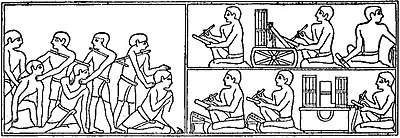Taxation as slavery
Taxation as slavery is the idea that taxation results in an unfree society in which individuals are forced to work to enrich the government and the recipients of largesse, rather than for their own benefit.

Historically, the earliest and most widespread form of taxation was the corvée, which can be traced back to the beginning of civilization. The corvée was state-imposed forced labour on peasants too poor to pay other forms of taxation (labour in ancient Egyptian is a synonym for taxes).[1]
In her book, American Patriots, journalist Gail Buckley wrote, "In British eyes, the American colonies existed only for the benefit of the mother country, but Americans saw any form of taxation as slavery."[2] Anarchists are some of the foremost proponents of the argument that taxation is equivalent to slavery. The International Society for Individual Liberty has made this claim,[3] as has Bureaucrash,[4] which refers to Social Security as "social slavery."[5] George Mason University professor Thomas Rustici uses two hypothetical anecdotes to illustrate this point. In the first, Sam Slime mugs a person for £50. In the second, Sam Slime votes for a politician who taxes a person in order to redistribute £50 to the "disadvantaged" Slime. Both examples involve the use of force. However, the second scenario is arguably worse, since through the state, Slime is now empowered to repeatedly take others' money, thus putting them in a condition of slavery. Leo Tolstoy argued that taxation of labor is one of three stages of slavery (the other two being land slavery and personal slavery).[6]
References
- David F. Burg (2004). A World History of Tax Rebellions. pp. vi–viii. ISBN 9780203500897.
- Buckley, Gail (May 14, 2002). American Patriots: The Story of Blacks in the Military From the Revolution to Desert Storm. Random House. p. 3.
- "Archived copy". Archived from the original on 2008-05-09. Retrieved 2008-07-29.CS1 maint: archived copy as title (link)
- "Archived copy". Archived from the original on 2008-06-29. Retrieved 2008-07-29.CS1 maint: archived copy as title (link)
- "Archived copy". Archived from the original on 2014-03-05. Retrieved 2013-09-30.CS1 maint: archived copy as title (link)
